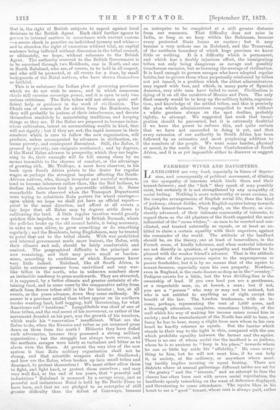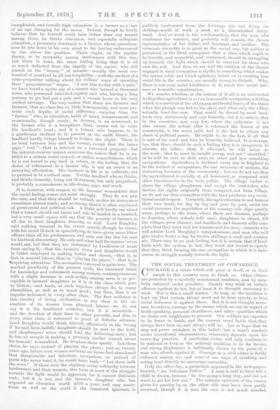FARMERS' WIVES AND DAUGHTERS.
LANDLORDS are very fond, especially in times of depres- sion, and consequently of political movement, of dilating on the sympathy of interests which binds them and their tenant-farmers ; and the " link " they speak of may possibly exist, but certainly it is not strengthened by any sympathy of, social feeling. Nothing is more noteworthy or more Curious, in the complex arrangements of English social life, than the kind of jealousy, almost dislike, which English squires betray towards English tenant-farmers. They ought, on the theory, so con- stantly advanced, of their intimate community of interests, to regard them as the old planters of the South regarded the more influential of the "mean whites,"—as men to be courted and con- ciliated, and treated externally as equals, or at least as en- titled to claim a certain equality with their superiors, against the remainder of the world. The attitude of the landlord should be, on the theory, one at least of benevolence, in the French sense, of kindly tolerance, and when material interests are not directly in question, of sympathy and readiness to be pleased with the weaker friend's advance. That is the attitude very often of the prosperous squire to the unprosperous or poorer freeholder, but it is by no means that of the squire to tenant-farmers, especially upon his own property. Nowhere, even in England, is the caste-fissure so deep as in the" country." Pedigree counts for a little, but the true dividing-line is the ownership of land. If you own land you are a gentleman, or a respectable man, or, at lowest, a man ; but if not, you are a " person " who may or may not be noticed, but who is not entitled to anything as of right except the benefit of the law. The London tradesman, with an in- come, perhaps, representing the rent of 5,000 acres, and a thorough education, complains, sometimes bitterly, of the wall which his way of making his income raises round him in society ; and the manufacturer of the North has still to bear, or fancy he has to bear, many a slight from men whom in his own heart he hardly esteems as equals. But the barrier which stands in their way to the light is thin, compared with the one which prohibits equality between the farmer and the squire. There is no one of whose social rise the landlord is so jealous, whom he is so anxious to "keep in his place," towards whom he can so little lay aside his "affability." He owes every- thing to him, but he will not meet him, if be can help it, in society, at the ordinary, or anywhere where meet- ing tacitly implies meeting on equal footing. There are districts where at annual gatherings different tables are set for " the gentry" and the "tenants," and an attempt to fuse the classes has often been met with severe social reprobation, the landlords openly remarking on the want of deference displayed, and threatening to cease attendance. The squire likes in his heart to see a " good " tenant, whose rent is always paid, rather
bumpkinish, and. bewails high education in a farmer as a sign of an age changing for the worse. Indeed, though he firmly believes that he himself could farm better than any tenant among them, he thinks education, and especially collegiate education, a pecuniary drawback to a farmer, whose querulous- ness he sets down in his own mind to his having endeavoured to rise above his position. There ought, on the regular theory, to be sympathy among landowners with this rise; but there is none, the inner feeling being that it is all so much deducted from the dignity of the squire, who will preach on the " luxury " of tenants—usually the most eco- nomical of mankind in all but hospitality—with the unction of a mine-proprietor talking about his colliers' ways of spending their " preposterous " wages. "I met him to-day with a pair," we have heard a squire say of a tenant who farmed a thousand acres, who possessed inherited capital, and. who, having a long journey to go, had put a pole and a second horse to his very modest carriage. The very notion that there are farmers and farmers, that no class has so little homogeneity, and none pre- sents such depths of social difference—varying from the " farmer " who, in education, habit of mind, temperament, and occasionally, though rarely, in descent, is an aristocrat, to the farmer who is a bumptious hind—seems not to enter the landlord's head ; and if a tenant who happens to be a gentleman declines to be present at the audit dinner, the landlord hardly brings himself to forgive the slight. There is no bond between him and the tenant, except that the latter pays" rent "—that is, interest on a borrowed property—but the interest-receiver cannot overcome the notion that he is en- titled to a certain social respect, or rather respectfulness, which he is not bound to pay back in return, or the feeling that the desire of refinement in a farmer who is not an owner is an annoying affectation. His business in life is to cultivate, not to pretend to be a refined man.Yet the landlord who so thinks, and thinks honestly, being not ill-natured, but only prejudiced, is probably a connoisseur in tile-drains, pigs, and muck.
It is, however, with respect to the farmers' womankind that the social feeling comes out most strongly. They do not pay the rent, and that they should be refined, excites an annoyance sometimes almost comic, and so strong, that it is often expressed at great social and political risk. A Duke will hardly say aloud that a tenant should eat bacon and ride Omarket in a tumbril, but a very small squire will say that the poverty of farmers is all due to their daughters dressing so well. Lord Burghley said nothing unusual in his recent speech, though he seems, with his usual ill-luck in speechifying, to have given more bitter offence than all his predecessors, and May one day lose his seat for his frank discourtesy. He only said what half the squires' wives would say, but that they are restrained by kindliness of heart from saying it, —that the farmers' wives and daughters would be better employed in making butter and cheese,—that is, in fact, in manual labour, than in "Playing the piano,"—that is, in "acquiring education. The accusation conveyed is quite true. The marked peculiarity of the present cycle, the increased thirst for knowledge and refinement among women, contemporaneous with a slight decrease in such avidity among men, is as per- ceptible in farmers' daughters as. it is in the class which goes to Girton,—and leads, as such impulses always do, to many absurdities, as well as to much good ; but then, that is an impulse welcomed in every other class. The first evidence in this country of rising civilisation in any class is the ex- emption of its women from physical labour—we do not say it is the healthiest evidence, but it is invariable— and the devotion of their time to other pursuits, and this, in every other class, is welcomed as proof of definite advance. Lord Burghley would think himself. offensively in the wrong if he said farm-bailiffs' daughters should be sent to the field, and shopkeepers' wives should load the delivering-carts; but he has no scruple in making a precisely similar remark about his tenants' womankind. He despises them openly. Let them churn, he says, instead of playing the piano ; just as, twenty years ago, before even women-servants on farms had abandoned that disagreeable and. laborious occupation, so praised of poets who never tried it, he would have said,—" Let them milk the cows." If there were the slightest social solidarity between landowners and their tenants, this form at least of the struggle towards the light would be approved, for it cannot diminish rent; but it is not, and the farmer's daughter who has acquired an education worth 2100 a year, and may marry twice as well as she could if she remained ignorant, is
publicly condemned from the hustings for not doing six shillings-worth of work a week as a discontented. dairy- maid. And so usual is the condemnation, that the man who condemns her remains, and probably will remain, the chosen representative of her father, and husband, and brother. The economic absurdity is as great as the social one, but neither is perceived, in the blind annoyance that a class which ought to be humble, and. respectful, and contented., should be struggling up towards the light which should be reserved for those who own the soil. And then we are told the relation of the classes engaged in rural occupation is idyllic, is something which makes the nation solid, and which agitators, intent on re-creating true social life in the counties, are morally wrong to disturb. Why, there is not even Social kindliness in it, much less social fair- ness or honorific consideration.
We wonder whether, at the bottom of it all, is an undetected feeling that agriculture is not an honourable occupation, a feeling which is a survival of the old pagan and feudal times, of the times when the plough was left to the slave, and when only the villein actually hoed the corn. That would be denied by most land- lords very strenuously and very honestly, but it is curious that in the countries, now very few, where the cultivator is not also owner, the actual tiller is esteemed the lowest of the community, is the worst paid, and is the last to obtain any share of political power. He ought to be the first, if all that is said of his work and him be honestly believed. It is strange, too, that there should be such a feeling that it is dangerous to educate the tiller ; that, if educated, he will never do the work ; that he must be caught young, and not "unsettled," or he will be sure to drift away to other and less ennobling occupations. Agriculture is declared every day in England to be the noblest of occupations, the one necessity of nations, the sustaining business of the community ; but we do not see that the agriculturist is socially at all honoured, as compared with other functionaries in the body politic. The village barber is above the village ploughman, and except the rent-taker, who derives his rights originally from conquest, not from tillage, we do not see that connection with the land produces any excep- tional social respect. Certainly, the agriculturists do not honour their awn trade, for day by day and year by year, under the social pressure, the population of the country-side slips quietly away, perhaps to the town, where there are chances, perhaps to America, where nobody tells one's daughters to churn, till the villages grow thinner, and landlords and farmers alike com- plain that they must seek for tenants and. for men,—tenants who will admire Lord Burghley's outspokenness, and men who will give twelve hours a day for twelve shillings a week and country air. There may be no such feeling, but it is certain that if land- lords wish the system to last, they must not reveal so openly that they think farming the one occupation in which it is inde- corous to struggle socially towards the light.



































 Previous page
Previous page